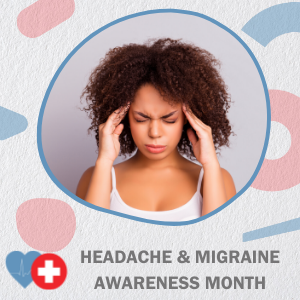Headache & Migraine Awareness Month
 Headaches and migraines affect millions of people every day. These conditions can be caused by a variety of triggers, from allergies and alcohol consumption, to menstruation, stroke, tension, and more. This June for Headache and Migraine Awareness Month, we look into these conditions, how they’re treated, and when you should seek medical attention for an immediate or long-term solution.
Headaches and migraines affect millions of people every day. These conditions can be caused by a variety of triggers, from allergies and alcohol consumption, to menstruation, stroke, tension, and more. This June for Headache and Migraine Awareness Month, we look into these conditions, how they’re treated, and when you should seek medical attention for an immediate or long-term solution.
Headaches: Types & Causes
Most people will experience headaches throughout their lives that are nothing to be terribly concerned about. However, some could point to chronic or life-threatening conditions. When looking at headaches, there are two classifications: primary headaches and secondary headaches.
- Primary Headaches: The result of over activity of or problems with the pain-sensitive structures within your head, including chemical activity in the brain, nerves or blood vessels surrounding the skull, or head and neck muscles. Common primary headaches are cluster headaches, migraines, and tension headaches. These can also be caused by underlying conditions such as chronic daily headaches, cough headaches, or exercise headaches. They can also be brought on by lifestyle factors, such as alcohol consumption, diet, lack of sleep, poor posture, being overly hungry, or stress.
- Secondary Headaches: These are associated with a disease or condition that activates the pain-sensitive nerves of the head. Some of the causes are minor, while others may be life-threatening. Possible causes include sinus infection, blood clot, brain aneurysm, brain tumor, concussion, dehydration, middle ear infection, encephalitis, hypertension, influenza, meningitis, stroke, and more.
Headaches: Treatments & When to Seek Help
Depending on the cause of the headache, simple treatments for headaches can range from over-the-counter pain relievers like ibuprofen, aspirin, or acetaminophen, to physical therapy, caffeine, or rest. However, seek emergency care at an ER or call 911 right away if you experience the worst headache you’ve ever had, a sudden, severe headache, or a headache that comes with any of the following symptoms:
- Confusion or trouble understanding speech
- Fainting
- Fever greater than 102F to 104F
- Numbness, weakness or paralysis on one side of the body
- Stiff neck
- Trouble seeing
- Trouble speaking
- Trouble walking
- Nausea or vomiting (unrelated to the flu or a hangover)
Even if you’re experiencing headaches that aren’t considered an emergency, you may want to talk with your doctor if you’re having headaches that:
- Are occurring more than usual
- Are more severe than usual
- Get worse or don’t improve after using appropriate dosage of over-the-counter medications
- Keep you from working, sleeping, or participating in normal activities
- Cause you distress
Migraines: Symptoms & Stages
Considered a type of primary headache, migraines have the potential to greatly interfere with daily life. During a migraine, you may experience throbbing pain or a pulsing sensation that is typically located on one side of your head. People commonly also experience nausea, vomiting, and extreme sensitivity to light and sound. These attacks can last anywhere from a few hours to days. Those who experience migraines will often begin having them sometime between childhood and early adulthood.
Migraines can occur in stages, although not everyone will experience every stage. These stages include:
- Prodrome: Occurs one to two days before a migraine. Individuals may notice changes that could indicate an upcoming migraine. These symptoms may include constipation, mood changes, food cravings, neck stiffness, increased thirst and urination, or frequent yawning.
- Aura: These may be experienced before or during a migraine. They are usually visual, but may include other sensations, and typically begin gradually, building up over several minutes, then lasting for 20 to 60 minutes. Migraine aura can include visual phenomena (seeing shapes, bright spots, or light flashes), vision loss, feeling of pins and needles in an arm or leg, hearing noises or music, or uncontrollable movements.
- Attack: This is when the migraine pain begins. The pain can last up to 72 hours if left untreated, and may be a rare occurrence, or can happen several times per month. People usually experience pain on one or both sides of the head, throbbing or pulsing pain, sensitivity to lights and sounds, possible sensitivity to smell and touch, nausea, and vomiting.
- Post-drome: After the migraine, it’s possible you may feel drained, confused, or simply washed out for a day. Others may experience an elated feeling. Be cautious, however, as sudden head movements can result in the pain briefly returning.
Migraines: When to Seek Medical Help
Migraines can often go undiagnosed and untreated, especially if experienced infrequently. For those who have had them before, over-the-counter migraine medication can help alleviate the pain when taken at the onset of symptoms. When you begin experiencing migraines regularly, it’s important to discuss with your doctor. Begin keeping a record of attacks, as well as notes on how you treated the pain to provide to your physician.
There are some symptoms, however, that require immediate medical attention or visit to the emergency room, including:
- Abrupt, severe headache, like a thunderclap
- Headache accompanied by fever, stiff neck, mental confusion, seizures, double vision, weakness, numbness, or trouble speaking
- Headache that occurs after a head injury, especially if it worsens
- Chronic headache that gets worse after coughing, exertion, straining, or sudden movement
- New headache pain that occurs after the age of 50
Because headaches and migraines can be caused by so many different things, it’s important to understand where yours may be coming from in order to receive proper treatment. If you are experiencing headaches or migraines on a regular basis that are not considered an emergency, visit Midwest Express Clinic today. We can help identify the cause of your pain and provide you with a treatment plan that will help you enjoy daily activities again.




